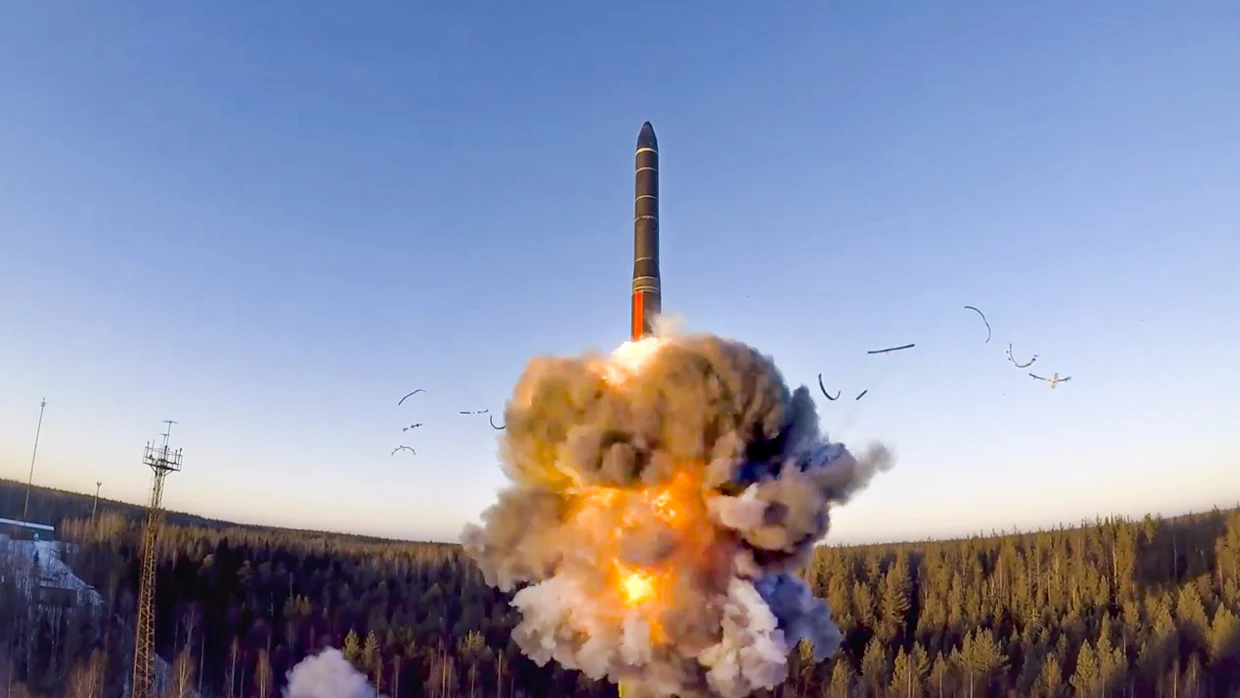The Russian Defence Ministry recently announced the successful test launch of an advanced intercontinental ballistic missile (ICBM) from a mobile ground-based missile system.
According to the statement issued on Wednesday, the missile, identified by the ministry as a “training warhead”, was launched on Tuesday from the Kapustin Yar State Central Interspecies Range in southwestern Russia.
“The missile's training warhead hit a mock target at the Sary-Shagan training ground (Republic of Kazakhstan) with given precision,” the ministry added.
While the defence ministry did not specify the type of missile used in Tuesday's launch, it said the exercise's purpose “was to test advanced combat equipment of intercontinental ballistic missiles.”
"This launch made it possible to confirm the correctness of the circuit design and technical solutions used in the development of new strategic missile systems," it added.
On February 20, Russia test-launched Sarmat ICBM, which can mount atomic strikes anywhere across the globe. Branded as "Satan 2" by Western analysts, the Sarmat is reportedly capable of carrying multiple nuclear warheads and is among Russia's next-generation missiles that President Vladimir Putin has described as “invincible”.
Moscow’s test launch of the advanced ICBM came amid extreme geopolitical tension between Russia and the West over the ongoing war in Ukraine. The statement came weeks after Russia, one of the largest nuclear powers, suspended its participation in the last remaining nuclear arms control pact with the United States, the world’s other nuclear superpower.
On February 21, President Putin announced the decision to suspend Russia’s participation in the Strategic Arms Reduction Treaty, or New START. Putin emphasized that Russia was not withdrawing from the pact altogether and he noted that Moscow would respect the caps on nuclear weapons set under the treaty, but asserted that it would not allow NATO countries to inspect its nuclear arsenal. In his speech, the Russian President also made it clear that Moscow will resume nuclear weapons tests if the US does so.
The New START treaty limits all deployed intercontinental-range nuclear weapons by Russia and the US and requires both countries to allow on-site inspections of their nuclear weapons-related facilities by the other.
Originally signed by former US President Barack Obama and former Russian President Dmitry Medvedev in 2010, the treaty was extended by five years in February 2021 during the first weeks of Joe Biden’s presidency. Currently, it is the only one left regulating the two largest nuclear arsenals in the world.
The mutual inspections of nuclear weapons-related facilities were paused in March 2020 due to the COVID-19 pandemic and formally suspended by Moscow in August 2022, after Washington attempted to resume the inspections. The Kremlin back then claimed that the tough confrontation between Russia and the United States over the war in Ukraine had hampered similar tours of US facilities by Russia. Russia’s Foreign Ministry explained that the ban on flights from Russia to the US and allied countries and visa restrictions made it impossible for Russian inspectors to travel to the US.
Since sending troops into Ukraine last year, Russia has repeatedly warned that the increasing Western support for Ukraine could trigger an open conflict between the nuclear powers.
Russian authorities have repeatedly criticized Western nations for their military assistance to Ukraine, arguing that the aid is not only fuelling the conflict but also boosting the risk of direct confrontation between Russia and NATO powers.
In addition, Moscow has long accused the West of provoking conflict with the expansion of NATO and the deployment of its weapon systems in proximity to the Russian territories.







 Armenian sappers commenced on Monday mine-clearance operations in the territories adjacent to the Saint Mary Church in village of Voskepar (Armenia...
Armenian sappers commenced on Monday mine-clearance operations in the territories adjacent to the Saint Mary Church in village of Voskepar (Armenia...
 Russian Foreign Minister Sergei Lavrov has reasserted that Moscow has no intentions to stop the fighting in Ukraine, even if peace talks commence.
Russian Foreign Minister Sergei Lavrov has reasserted that Moscow has no intentions to stop the fighting in Ukraine, even if peace talks commence.
 Iran has refuted reports of alleged damage to Shimon Peres Negev Nuclear Research Centre located southeast of Dimona, Israel, during the recent air...
Iran has refuted reports of alleged damage to Shimon Peres Negev Nuclear Research Centre located southeast of Dimona, Israel, during the recent air...
 Iran and Pakistan have signed eight cooperation documents in various fields, and agreed to strengthen ties to fight terrorism in the region.
Iran and Pakistan have signed eight cooperation documents in various fields, and agreed to strengthen ties to fight terrorism in the region.



